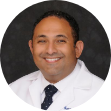Endoscopic Ultrasound (EUS) in NJ
What is EUS?
You’ve been referred to have an endoscopic ultrasonography, or EUS, which will help your doctor evaluate or treat your condition. The following information is meant to give you a basic understanding of the procedure – how it is performed, how it can help, and what side effects you might experience. It can’t answer all of your questions, since a lot depends on the individual patient and the doctor. Before your procedure, your doctor will speak to you about your individual situation and answer any additional questions you have.
An endoscopic ultrasound scope is a thin, flexible tube with both a camera and an ultrasound device on the tip of the scope. This scope is inserted into either the mouth or the anus to allow your doctor to examine the lining and the walls of your upper and lower gastrointestinal tract. The upper tract is the esophagus, stomach, and duodenum; the lower tract includes your colon and rectum. EUS is also used to study internal organs that lie next to the gastrointestinal tract, such as the biliary system and the pancreas.
Why is EUS Performed?
EUS can provide your doctor with more detailed pictures of your digestive tract anatomy than many other imaging studies, such as CT scans. At the time of EUS, your doctor also has the ability to obtain a biopsy of any abnormality found, through a process called fine needle aspiration (FNA). Because of this, EUS can be used to further evaluate a variety of medical conditions. For example, EUS can be used to evaluate an abnormality, such as a growth, that was detected at a prior endoscopy or by x-ray. By providing a detailed picture of the growth, and a biopsy of that growth if necessary, EUS can help your doctor determine its nature and decide upon the best treatment.
How Should I Prepare for EUS?
In order to prepare for your EUS, you should have no solid food or dairy products after midnight, the day before your procedure until after the exam is finished. You may have clear liquids until 4 hours before your procedure (water, broth, clear apple juice, coffee/tea (no milk), ginger ale, etc.) For EUS of the rectum or colon, your doctor will instruct you as to whether or not you need to take any laxatives or enemas prior to the examination.
Tell your doctor in advance of the procedure about all medications that you’re taking and about any allergies you have to medication. He or she will tell you whether or not you can continue to take your medication as usual before the EUS examination.
Antibiotics aren’t generally required before or after EUS examinations, even if you normally take antibiotics before dental procedures. Your doctor might prescribe antibiotics if you’re having specialized EUS procedures, such as to drain a fluid collection or a cyst using EUS guidance.
If you received sedatives, you won’t be allowed to drive after the procedure, even if you don’t feel tired. You should arrange for a ride home. You should also plan to have someone stay with you at home after the examination, because the sedatives could affect your judgment and reflexes for the rest of the day.
Procedure Prep InstructionsWhat Can I Expect During EUS in New Jersey?
You will receive sedatives intravenously to help you relax. You will most likely begin by lying on your left side. The actual examination generally takes between 30 to 60 minutes. After the procedure, you will be monitored in the recovery area until most of the sedative medication’s effects have worn off. If you had an upper EUS, your throat might be sore. You might feel bloated because of the air and water that were introduced during the examination. You’ll be able to eat after you leave the procedure area, unless you’re instructed otherwise. Your doctor generally can inform you of the results of the procedure that day, but the results of some tests will take longer.
What are the Possible Complications of EUS?
Although complications can occur, they are rare when doctors with specialized training and experience perform the EUS examination. Bleeding might occur at a biopsy site, but it’s usually minimal and rarely requires follow-up. You might have a sore throat for a day or more. Nonprescription anesthetic-type throat lozenges and painkillers help relieve the sore throat. Other potential, but uncommon, risks of EUS include a reaction to the sedatives used, backwash of stomach contents into your lungs, infection, and complications from heart or lung diseases. One major, but very uncommon, complication of EUS is perforation. This is a tear through the lining of the intestine that might require surgery to repair.
The risk of complication increases slightly if fine needle aspiration is performed during the EUS examination. When fine needle aspiration of the pancreas is performed, there is the additional risk of pancreatitis, although this is also uncommon. These risks must be balanced against the potential benefits of the procedure and the risks of alternative approaches to the condition.
Those in the Hillsborough, NJ area in need of an endoscopic ultrasound can have this test performed at Robert Wood Johnson University Hospital Somerset, Somerville, NJ. Please call 908-218-9222 to schedule your appointment.
Gastroenterology Care in NJ at Digestive Healthcare Center
At DHC, we put your digestive health first. Our team of gastroenterologists serves patients at our Hillsborough, Somerville, and Warren locations, as well as through telemedicine appointments from the comfort of your home. Our team is skilled and experienced in performing endoscopic ultrasounds and a variety of other procedures focused on digestive wellness. If you have any questions about your need for EUS, alternative approaches to your problem, the cost of the procedure, methods of billing, or insurance coverage, do not hesitate to contact us to learn more. We look forward to hearing from you and helping you get on track to better digestive health.


























